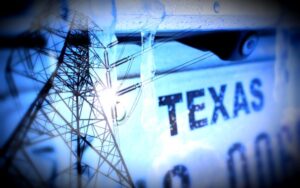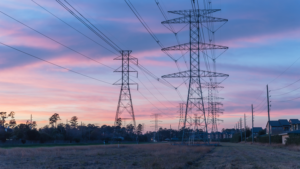
By JOHN KANELIS / johnkanelis_92@hotmail.com
What do you suppose is on the minds of the 181 men and women meeting in the State Capitol for the next few weeks? I think I know.
One of those things has to do with electricity, and whether Texas can avoid the problems it encountered when a monstrous winter storm blew in over the state in the middle of February. Millions of Texans lost their electricity, the ability to heat their homes. What’s more, the water went out in millions of other homes and businesses.
Legislators convened their session in early January and Gov. Greg Abbott tasked them during the storm to get busy looking for solutions to the crisis, which he deemed “unacceptable.”
I have set out trying to learn what Northeast Texas legislators are thinking about how to solve the problem. One possible – albeit preliminary – idea comes from freshman state Sen. Drew Springer, who has filed a Senate bill requiring that all members of the Electric Reliability Council of Texas actually live in the state where ERCOT manages the electrical grid.
Springer, a Republican from Muenster, moved to the state Senate from the state House of Representatives after winning a special election in Senate District 30 to replace former state Sen. Pat Fallon, who was elected to the U.S. House.
Seven members of the ERCOT board have quit; six of them live outside the state. Springer wants to invoke a residency requirement, a notion endorsed enthusiastically by state Rep. Scott Sanford, a Republican from McKinney.
At issue are ways to prevent catastrophic failure, which ERCOT said could have happened, that the state electrical grid was literally minutes away from complete collapse.
Solutions will cost money. They might involve investment of huge sums of money to winterize the power generating system. Sanford is open to dipping into the state’s Rainy Day Fund. “Whatever we decide,” Sanford said, “Texans are going to pay, either through taxes or utility costs.” The Rainy Day Fund, though, could be available to help defray some of that cost. “It didn’t rain, but we had an emergency on a large scale,” Sanford said.
State Rep. Bryan Slaton, a Royse City Republican, said he isn’t terribly concerned about the price tag associated with the repair of the grid, declaring that the state simply has to get the job done.
Slaton, serving in his first legislative session, said he lost power at his Royse City home “for just a little while,” but added that the apartment where he lives during the session with his wife and children lost power and water for several days. “I wasn’t in Austin when the power went out,” Slaton said, adding that “it took me six hours to drive from Austin to home,” noting that it usually takes a lot less time.
Slaton said he is willing to work “as long as it takes” to find a solution to the electrical grid problems.
He said the failures were across the board and all the energy sources need attention. As for whether “green energy” was a major culprit, as suggested by Gov. Greg Abbott, Slaton said “green energy has proven to be unreliable.” He said wind and solar plants froze up, as did natural gas stations. Slaton believes nuclear energy, which provides even less power to the grid than solar or wind energy, is “the most reliable source” that Texans can use.
“A lot of things went wrong with the grid,” Slaton said. He said that in 2019, state Sen. Bob Hall of Van Zandt County and state Rep. Tony Tinderholt – both Republicans – commissioned a study to look at ways to “harden the grid.” Slaton said he is unclear on the status of the report they submitted but suggested it might provide a good starting point for the 2021 Legislature to consider.
He also said that he has filed a bill to require that the Public Utility Commission of Texas become an elected rather than an appointed body. “That way, when things go wrong, we can hold the PUC board accountable at the ballot box,” Slaton said.
Sanford, who is executive pastor (which he said is akin to being business manager) of Cottonwood Creek Church in Allen, is serving in his fifth legislative session after winning election in 2012. He said, “The first thing we have to do is understand what happened and examine the policies that contributed to the crisis.” He said the state hasn’t yet “reached that point” of determining which policies to change.
Indeed, Sanford experienced some personal misery at his home in McKinney, which he said suffered from a burst water pipe. So, it is safe to presume that the lawmaker also has some skin in this legislative game of looking for solutions to the state’s electrical grid.
Sanford did say that ERCOT and the PUC need to develop greater ability to “send up red flags” and then communicate to Texans in advance of these weather events how to deal with them. “The warning system needs to be transformed,” Sanford said.
Slaton and Sanford seem to disagree – if only a little a bit – on whether Gov. Abbott was correct to blame the Green New Deal for the failure of the electrical system, although Sanford is reluctant to get into a partisan battle. “The last thing we need to do is get into a Democrat vs. Republican deal,” Sanford said, imploring the Legislature to “put Texans first.” Sanford did say that he prefers “reliable” energy over “renewable” energy, which he suggested has proven so far to be an unreliable source for Texans.
Sanford said he is “intrigued” by the idea that Slaton has pitched, making the PUC an elected body, and he “absolutely” believes the state should require ERCOT board members to live in Texas.
Slaton said he is willing to work “for as long as it takes” to find solutions to the disaster that the state came within minutes of experiencing.
It seems a safe bet to presume that Rep. Slaton’s legislative colleagues are willing as well to stay on the job until they fix the problem. Millions of Texas residents will demand it.
Rest assured I will be among them.
BLOGGER’S NOTE: A version of this blog was published initially on KETR-FM’s website.


